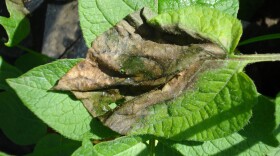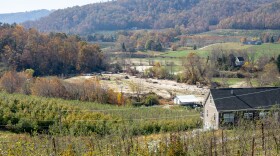Researchers at North Carolina State University are searching for Salmonella in North Carolina's tomato crops. The bacteria causes salmonellosis, a disease that can range from uncomfortable to deadly, and tomatoes in Florida and Virginia have been the sources of outbreaks. Despite North Carolina's close proximity and similar climate, local tomatoes have been safe from the pathogen. A team of scientists from N.C. State's College of Agriculture and Life Sciences is investigating why.
The three-year study, which is just beginning year two, is a collaborative effort with the FDA studying the relationship between Salmonella, potential environmental reservoirs for the bacteria and commercial tomato production.
The first goal is figuring out exactly where Salmonella is located in the crops.
“The purpose of the study is to locate environmental reservoirs of Salmonella,” said Chris Gunter, assistant professor of horticulture science at N.C. State and member of the five-person research team. “These bacteria can exist in the environment. We want to know where.”
The dirtiest job may lie with Diane Ducharme, a graduate student working toward a doctorate in horticultural science. To collect samples for the study, Ducharme regularly visits three tomato production areas in the state. She gathers tomatoes and plant leaves, but also surrounding soil and fecal matter, like goose droppings. Salmonella is most often associated with fecal matter that is present in the natural environment.
The water source for the crops is also important. The FDA warns that contaminated surface water can easily carry bacteria to plants. During her trips, Ducharme collects samples from surrounding water sources.
Researchers hope that the results of this study will help farmers as they work to implement new requirements of the federal (FSMA). The law broadens the power of the FDA to regulate food production, which means crop growers will have an increased responsibility for the safety of their food.
Study results, though focused on tomatoes, may help reduce the possibility of Salmonella contamination during the growing process of all crops.
“Ultimately, we hope that we will gain a better understanding of where that pathogen exists, how it moves into crop production areas and then how to mitigate any risk that may be associated with the pathogen," said Gunter in a statement from N.C. State.
The other scientists involved in the study are Lee-Ann Jaykus, professor of food science, Otto Simmons III, research assistant professor of biological and agricultural engineering and Penelope Perkins-Veazie, professor of horticultural science.










